
I had a lot to share about the interface between life and cinema as per its accurate representation in REVOLUTIONARY ROAD and the previous two posts were about all those thoughts. This final write up on the film adaptation of a beloved novel is about other salient features that stood out for me. First things first : the two protagonists are not seeking an escape route but practicality and following the template of the everyday like everybody else has brought them undone to such an extent that even a transitory / temporary alternative looks like a certain path breaker for them.

They are approaching a crossroad and something away from the league is far better than everything else they have attuned themselves to . Of course their bourgeoisie background allows them the leeway to think for a far reaching change. The fact that the exercising of those innocent wishes is nipped in the bud is tragic because they try hard to adjust but fail to steady the boat that has already left the shore. So in the end, even a certitude of financial security and savings come to naught. Souls crushed and broken, the final twenty minutes are easily the most arresting as they mimic little movements of the everyday that hide trappings of a great personal turnaround for so many of us. It’s time we realize that just because we are not one of them is no sane argument. REVOLUTIONARY ROAD asks us to distribute empathy within ourselves and to others and take almost nothing for granted, especially those vital signs when someone’s unhappiness is etched on their very being. Ignorance never brought anyone bliss and this heart rending work is in line with our realities.

Following are the pivotal aspects of the film as I observed them, subsumed with the social and the cultural.

******
*** FIRST OF ALL, Kate Winslet and Leonardo Di Caprio have faces, voices, personas that are timeless and can fit into any era ; so their presence is strong to make the film’s concerns firmly rooted in the fifties setting and at the same time outlast that epoch and come close to the surface in the very present. It’s an acute sense of expertise they have accustomed themselves to.
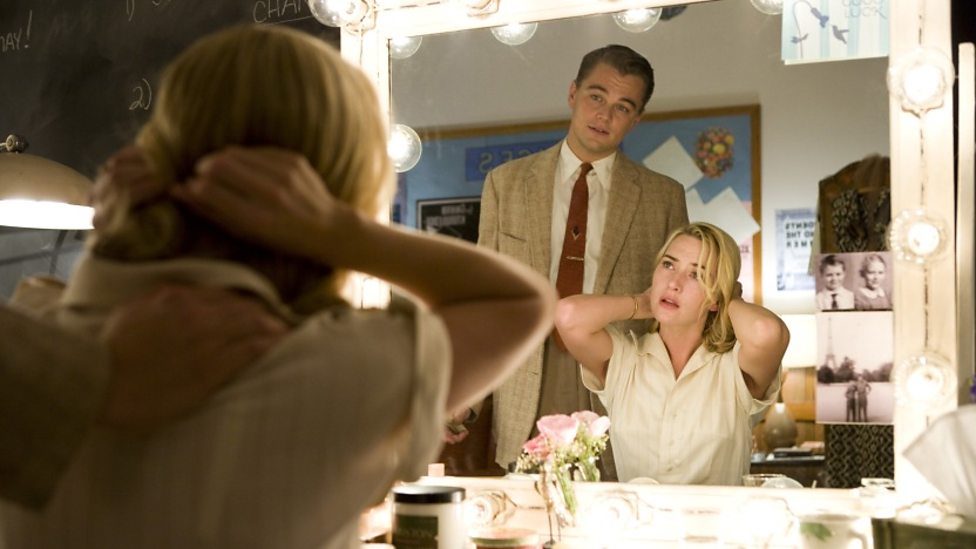


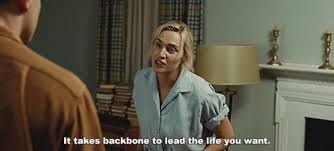



These seven pictures seem to convey the ebbs and flows of the couple which has reached volatile resolutions within a tender bond of many years. Sort of like how different emotions can find place in the private world of this couple in a week. Seven days bringing several sentiments that are aired by both .
*****
**** THE WIFE hits an emotional dead end when the prospect of raising a third child becomes more challenging as her life has already taken a 360 degree turn.

Her own choice is unacknowledged as for the fountainhead of a family unit that a woman is, everything has to be taken in her stride. It’s cruel the way no outlet seems to be in store for her and this is where the social implication of childbirth and looming possibilities of abortion come to the fore. Winslet sears our soul with her pitch perfect approximation here.

Our hearts go out to her. The right to make a delicate choice for herself is poised against her and it’s as much a glaring truth now as it was back then, especially in the backdrop of contentious abortion laws in Ireland and other provenances which have been scrutinized over the years .
*****
*****THE MIS EN SCENE, that is the sequence of scenes and props and settings, is instrumental in designing the emotional authenticity of a work like this. In REVOLUTIONARY ROAD as I said earlier, the life scripts are operating on seismic tones of the quotidian, day to day events. Everything is normal as surface appearances seemingly are and suburbia stands as the custodian of that prim and proper conditioning.

A breakfast table, an exit from the front door, a look out of the window, a dejected possibility of a better life – an individual one, not an utopian idyll, a tryst really with possibility which may or may not succeed – written on visages can have an implosive impact by sunset.

By the time we reach the climax, these points lend greater urgency to the manner in which the scenes are staged. Melancholy runs in this upwardly mobile stillwater and the question – what will people say? – rules the roost. Stilted community ethics all come to the head by the closing minutes then. The war is truly at home and no picture window, pruned lawns and crystal clear interiors can mask the raging storm and tinkling of an upheaval in a person. Every detail counts here.
*****
****** THE REST OF THE CAST IS WONDERFULLY REALISTIC TOO. Kathy Bates as the real estate agent and kindred is emblematic of the freedom of employment and finance that women readily adopted in the war years. Her continuum in the field of real estate in this post war timeline is impressive as opposed to the domestic stasis of Kate and her share of support to Kate’s character is within the purview of all she can do. Bates is exceptional as always. There’s a clue here as to how financial independence can work wonders for women in our society even though it is a greater force now. Her experience in terms of age hardly prepares her for what is lying around the corner for the central couple.


Michael Shannon plays her son and his part expertly touches upon the whispered concerns about mental health and society’s deplorable neglect accorded to them even in an already singed post war epoch. He airs thoughts nobody else would and his earnestness never becomes a portrait of caricature. A particularly volatile confrontation is set around all these parts. His father played by Richard Easton is the sober, silent witness to the greater unraveling within this scene he features in.
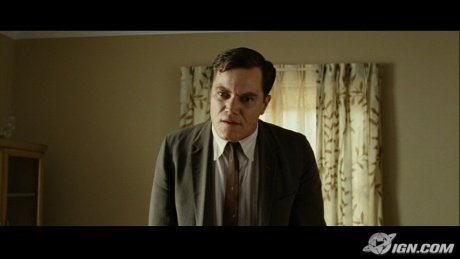

Dylan Baker is here as the husband’s ( Leo) colleague at the workplace who is a man of convention while Zoe Kazan is the secretary who too is trapped by those same codes and succumbs to them without any prior expectations.
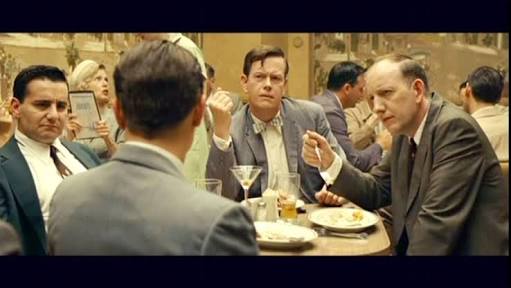
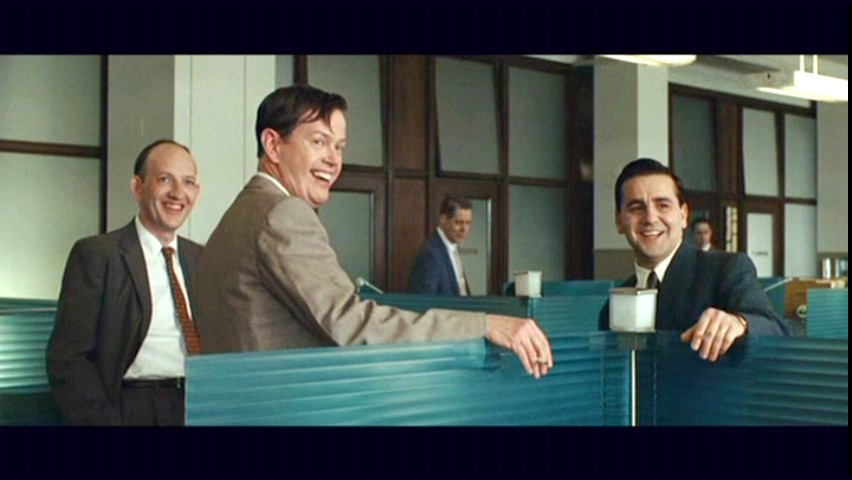
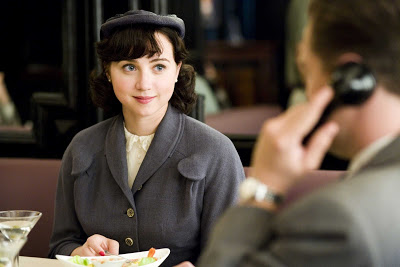
The good neighbors and friends of the couple have an effective arc here as well . David Harbour is another figure who nurses a void which he cannot fill by means of an attraction while his wife is played by Kathryn Hahn. Her beautiful, amiable charm and smile have always been her distinctive traits in other roles. Here their lives are bursting through the cracks.



When Kathryn Hahn’s suburban housewife embraces her husband and feels relieved that they shared something in common in terms of their thinking, a piece of us reaches out to her and them.


They may be no different from their neighbours internally but at least they effect a moment of acknowledgement between them. It’s a beautifully crafted scene. So all actors contribute majorly to the film’s overall aura and heft.
*****
******* SET AROUND the late 40s to the mid 50s as the film is , another point struck me about it. In post war America, you would think young demographics would have opted for a more broader, holistic outlook but then responsibilities have a way of making us conform and this conditioning rears its head here in the screenplay. The complexity of human conventions is hard to pin indeed.
*****
******** LAST BUT NOT THE LEAST, Thomas Newman’s central theme for the musical score occurs throughout the film and is its quintessential strength. It is aligned with the plot and has endeared itself to me.
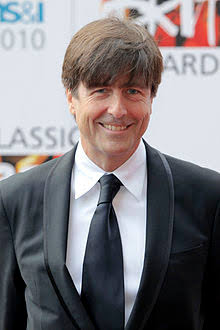
The pianos softly touch upon this superficial suburban undertow – an extended dollhouse of appearances, pretty, pruned people restoring a post war baby boom generation. The gentle churning is matched by the piano ivories. Then strings invite the greater force of the self longing for beauty and simultaneously shackled by too many diktats. The tragedy of the couple is captured with precision by this composer and his team. Every aspect hence makes a cohesive whole. The music has the continuum of settled lives, a sense of containment bursting at its seams.

*****
So put together, REVOLUTIONARY ROAD is hard hitting and an amalgamation of talents and sincerity.
*****
A very thoughtful and well researched post. Enjoyed every word!
LikeLike
Thank you for your acknowledgement.
LikeLiked by 1 person
Thank you for sharing your ideas
LikeLike